-
We have been used to wearing masks(口罩)in public since February. About 300 million masks are used and then thrown away every day in China. Where do these masks go? You might think they just go in a rubbish bin. But that's just the first stop on the masks' journey.
After the masks are thrown into the bins, rubbish trucks empty the bins and take the rubbish to landfills(垃圾场). Next, the masks will be taken to rubbish incinerators(焚化炉)and burned. Burning masks might not seem to be very good for the environment. Won't it cause pollution?
The answer is "no", according to China Daily. The main material of most masks is polypropylene(聚丙烯). It's non-toxic(无毒的). After burning, it changes into water and CO2.
In fact, burning the masks can bring some benefits(益处). The process of burning the rubbish can produce electricity. Burning one ton of rubbish can produce more than 400 kilowatt hours(度)of electricity. Some people make a prediction that there will be 162,000 tons of used masks in China this year. Burning all of them can produce more than 64 million kilowatt hours of electricity. This is enough to make an electric car drive about 370 million km, which is 9,250 times as long as the earth's equator.
At last, the slag(残渣)from burning masks can be recycled to make bricks(砖块)or fill the roads.
1.How many masks are used and then thrown away every day in China?
A.More than 64 million. B.About 300 million. C.About 370 million. D.About 9,250 million.
2.The first stop on the masks' journey is ________.
A.electricity factories B.landfills C.rubbish trucks D.rubbish bins
3.The main material of most masks is________.
A.plastic B.polypropylene C.water D.CO2
4.Which of the following is TRUE according to the passage?
A.Burning masks won't cause pollution.
B.People are not used to wearing masks in public.
C.There are 162,000 tons of used masks every month in China.
D.The process of burning the masks can produce electricity and bricks.
5.What is the best title of the passage?
A.How do We Burn Used Masks? B.How do People Produce Electricity?
C.Where do the Used Masks Go? D.Why do We Throw Away Used Masks?
-
People produce ___ rubbish each year, and it’s very wasteful.
A. tons of B. millions of
C. a large number of D. a amount of
-
看图短文填空
China has the largest number of smokers in the world. Each year, about one million Chinese 1.________of smoking related illnesses. 2.________smoking is a bad habit, people still enjoy smoking. Why? Because some of them think it is a kind of fashion. Official statistics (统计) in 2011 showed that China 3._______ 300 million smokers, with another 540 million people forced to breathe in.
China 4.____ part in the World Health Organization Framework Convention on Tobacco Control (《世界烟草控制框架公约》) in 2006.Governments at different levels have paid more money to tobacco control in the last few years. Beijing, Shanghai and Hangzhou have tobacco control rules. For example, Smoking in5.________ has not been allowed since January, 2011.
Selling tobacco to less younger than 18 is not6._______.The seller should ask the buyer to 7.________ his or her ID card if he can not see8.________ old the buyer is.
Smoking is harmful and it is not only bad for smokers themselves, but9.____ bad for non-smokers. For others and for yourself, please give up10._______.

-
In China, each year we produce about 150 million tons of city waste according to a report. Where does the waste go? People usually burn or bury(埋)it. On the other hand, we receive waste from some developed countries. We get useful materials from it. What about the useless part? Still burned or buried. But is it a proper way?
Waste pollutes the environment, harms people's health and causes animals to die. It also gets in the way of green and sustainable development. We can't make money at the cost of the environment. We should leave clean water and green mountains to our next generations(一代人).
China is getting really serious about waste now.
We are taking less waste from developed countries. From January 2018, China started to stop 24 kinds of waste coming into our country. And more laws and rules about dealing with waste have been made. Anyone who breaks the law will be punished.
China also tries to put waste into good use. One example is the waste electricity factories. They burn waste to make electricity in a green way. No harmful gases or water will get into the environment.
The Chinese government is encouraging people to do waste sorting(分类). Cities like Shanghai, Chongqing and Beijing have their own sorting systems. More will join them soon. As President Xi Jinping said during a visit to Shanghai, waste sorting is a new fashion(时尚). More and more people are forming the habit of separating their waste.
1.The writer starts the passage by _________.
A.telling stories B.comparing numbers
C.raising questions D.giving suggestions
2.The underlined word "sustainable" in Paragraph 2 means "________"in Chinese.
A.可享受的 B.可持续的 C.可借鉴的 D.可复活的
3.From the passage, we know that _________.
A.waste does harm only to the environment
B.those who break the law may not be punished
C.China stops getting waste from developed countries
D.waste sorting starts to become popular in China
4.The structure of the passage may be_________.
(①=Paragraph1 ②=Paragraph2 ③=Paragraph 3 ④=Paragraph4 ⑤=Paragraph 5
⑥=Paragraph 6)
A.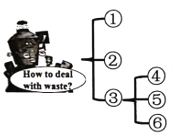 B.
B.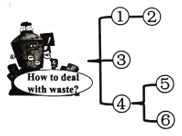
C.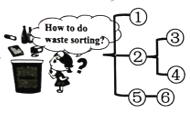 D.
D.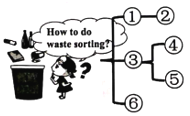
-
We all waste food, you and me, every day, millions of tons of it. In China, enough food is wasted in restaurants every year. 1. So everyone is encouraged to stop wasting food in our country now.
So what should Chinese consumers(消费者) do to prevent food waste?
2. All of us should keep a kitchen diary. From the diary we can know that how much food we wasted at home. 3. We should eat everything we have bought. We should keep the food we have bought well so that it’s fresh before we eat it.
Buy only what we need. 4. We should also check how much food we have before buying more. We shouldn’t take much food we don’t need even if large posters ask us to do so.
Develop the habit of packing food. Chinese consumers are generous(慷慨的) and friendly. 5.
And much of it is wasted. So when ordering dishes, we are supposed to order food that is just enough. We’d better order smaller servings in restaurants and take home what we cannot finish.
Don’t put it off! Let’s stop wasting food today!
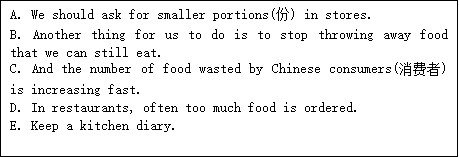
-
We all waste food, you and me, every day, millions of tons of it. In China, enough food is wasted in restaurants every year to feed 200 million people. And the amount (数量) of food wasted by Chinese consumers (消费者) is increasing fast. So our nation is being encouraged to stop wasting food.
So what should Chinese consumers do to prevent food waste?
♦ Keep a kitchen diary
All of us should keep a kitchen diary, and we can know that how much food we waste at home. The first thing for us to do is to stop throwing away food that we can still eat. We should eat everything we buy and if we cannot, we should buy less.
♦ Buy only what we need
We should ask for smaller portions (部分) in stores. We should also check how much food we have before buying more. We shouldn’t bring much food we don’t need home even if large posters ask us to do so.
♦ Develop the habit of packing food
Chinese consumers are generous (慷慨的) and friendly. In restaurants, often too much food is ordered and served. So when ordering out, we are supposed to exclude (排除) the food if we don’t plan to eat it. And order smaller servings in restaurants and take home what we cannot finish.
Don’t put it off! Let’s stop food waste today!
1.Why is our nation being encouraged to stop wasting food?
A. Because there’s enough food for Chinese people.
B. Because Chinese consumers like to try delicious food.
C. Because the number of food wasted by us is growing fast.
D. Because it’s traditional to invite friends to dinner in China.
2.Miss Li is a housewife. She’d better __________ at home.
A. keep a kitchen diary B. buy things as much as possible
C. cook too much food for her family D. keep the food as long as possible
3.Your friend invites you to dinner, which of the following is NOT right?
A. He asks for the right portions.
B. You leave a lot of food on the table.
C. You ask your friend to order less food.
D. He takes away the food that you can still eat.
4.As teenagers, what should we do to stop food waste?
A. Have a balanced (平衡的) diet. B. Eat less food to keep healthy.
C. Keep the balance of nature. D. Have a good habit of clearing the plate.
-
The world uses about a thousand million tons of water a day. Water is a human right(权利)and everyone should have their share. Yet more than 700 million people around the world have trouble getting clean, safe water.
Treating wastewater is a good way to provide fresh water for us. And it also helps the environment by keeping waste out of rivers and oceans. 80% of wastewater around the world is not treated at all, and it is running into oceans. But now we have got the technology to treat and reuse the wastewater.
While 75% of our planet is covered with water, only 2% is fresh water — that comes from rivers, lakes, ice and snow. The rest, 98% of the water, is in seas and oceans. It is too salty to drink. Then desalination businesses come in. More than 19, 000 factories have been built around the world, mostly in coastal countries. They process(加工) more than 92 million tons of water every day. But the technology they use requires a lot of energy.
Scientists are working to create a less costly technology. They want to produce 20 times more clean water and make sure everyone has enough. But for now, the world still faces each day with not having enough water for everyone.
1.Treating wastewater helps the environment by __________.
A.storing waste in ice and snow B.waste in ice and snow
C.keeping waste out of rivers and oceans D.sending waste to coastal countries
2.What does the underlined word "desalination" in Paragraph 3 mean?
A.远洋运输 B.潮沙发电 C.食盐销售 D.海水淡化
3.What can we infer from the last paragraph?
A.Water should be a human right. B.The water problem is still serious.
C.Our planet is covered with water. D.Everyone has enough clean water.
-
When autumn comes, it’s harvest time in China. China’s grain output(粮食生产)was about 664 million tons in 2019. Rice made up much of the output. How important is rice? What other uses are there for it? Let’s learn more together.
Rice on your dinner table is common. But it is very important for the human body. It build up people’s energy. About two-thirds of the world’s people eat rice.
Rice is easy to grow with enough water. People can grow it on wet and dry land, in rain forests (热带雨林) or deserts(沙漠). It grows well between 18℃ to 35℃. A good rainfall also helps its harvest rice.
In China, people began to grow rice about 3, 000 to 4,000 years ago. Now, Chinese people eat almost every day. They cook fried rice and porridge. There are also some rice-based foods for festivals. Every Spring Festival, people make New Year’s cake with sticky rice(糯米), With it, they wish for a better future. The Dragon Boat Festival is a time to eat zongzi. People remember the great poet Qu Yuan on that day.
1.Was China’s grain output about 664 million tons in 2019?
__________________________________________________________________________________________
2.What do about two-thirds of the world’s people eat?
__________________________________________________________________________________________
3.When did people begin to grow rice in China?
__________________________________________________________________________________________
4.Because of COVID-19, is China’s grain output(粮食生产) enough for Chinese this year? why or why not?
__________________________________________________________________________________________
-
People produce rubbish each year, and it’s very wasteful.
A.a fair amount of B.millions of C.a large number of D.a great many
-
Every year billions of tons of rubbish in Europe. Are you shocked by this?
A.produces B.are produced C.be produced D.has produced
 B.
B.
 D.
D.

